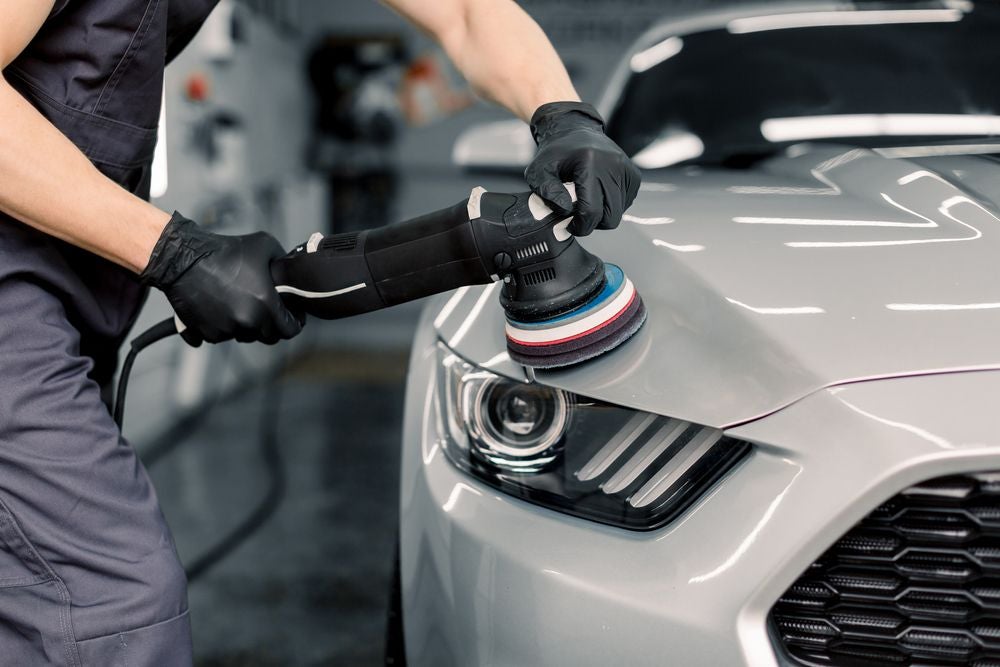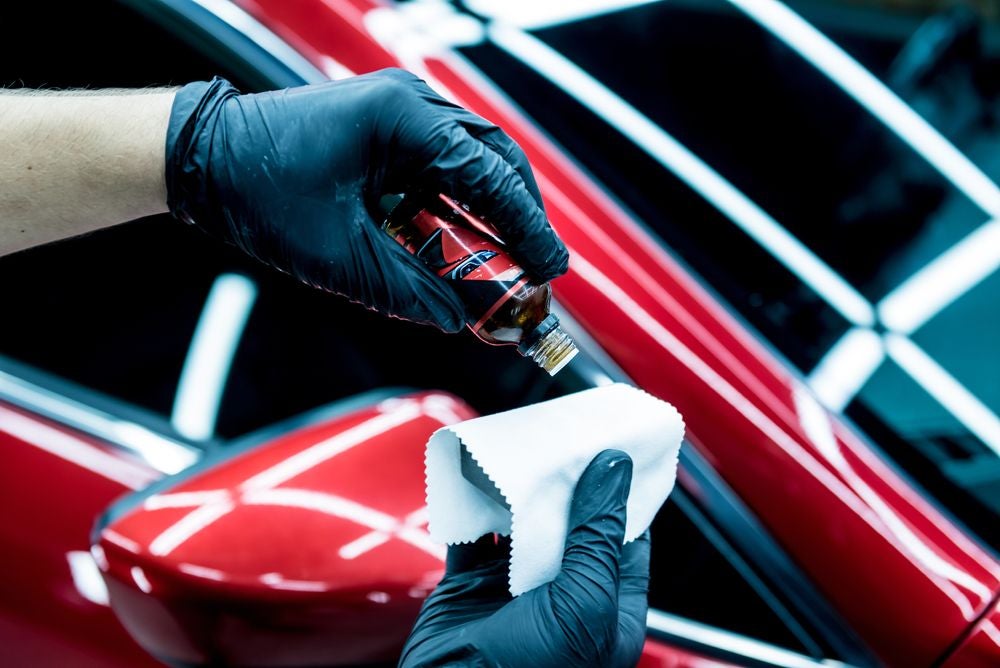Are you tired of seeing your car's paint dull and fade away over time? Do you want to protect your ride from harsh weather conditions and harmful elements? If so, you might consider getting a protective coating for your car. But with so many options available, how do you know which one is best? Fear not, because we're here to settle the age-old debate of Teflon coating vs ceramic coating for cars.
Think of Teflon coating as a raincoat for your car, while ceramic coating is more like a suit of armour. Both provide excellent protection against UV rays, water and humidity-related damage, bird droppings, and other environmental factors that can damage your car's paint. However, the two differ in terms of durability, longevity, and cost.
So, which coating is best for your car? That ultimately depends on your budget and personal preferences. For now, we'll get acquainted with both Teflon and ceramic coating and help you make an informed decision. Let's get started!
What is Teflon Coating?

Teflon coating is a popular aesthetic upgrade in the automotive industry that promises to provide your vehicle with a protective layer against environmental hazards. It is an effective way to protect your vehicle's paintwork, and its numerous advantages make it an attractive option for many vehicle owners.
Usually made from a chemical compound called polytetrafluoroethylene, or PTFE, Teflon coating forms a protective layer on the surface of your car, creating a barrier against the elements that can cause damage to the paint.
Read More : Types Of Automotive Paints, Step By Step Painting Process Explained
Advantages of Teflon Coating
- Protection: Teflon coating provides excellent protection against environmental hazards such as UV rays, rain, and other pollutants that can cause damage to the paintwork.
- Water Repellent: It is hydrophobic, which means it repels water and prevents water spots and stains from forming on the paintwork.
- Durability: Teflon coating lasts longer than a traditional wax coating, offering long-lasting protection for up to 2-3 years.
- Easy Maintenance: Teflon coating makes cleaning your vehicle much easier, as dirt and grime can be easily wiped away with a microfiber cloth.
- Aesthetic Appeal: Your vehicle’s appearance is enhanced with the shine and gloss that Teflon coating can provide.
Disadvantages of Teflon Coating
- Limited Protection: While Teflon coating provides excellent protection against some of environmental hazards, it may not be effective against more severe weather conditions or scratches.
- Cost: Teflon coating is done by professionals and is relatively expensive compared to traditional waxing or sealants, making it less accessible for budget-conscious vehicle owners.
- Tedious: Before applying Teflon coating, the vehicle's paintwork must be thoroughly cleaned and prepared, which can be a long and tiring process.
- Health Concerns: During the application process, Teflon coating emits fumes that can be harmful to your health if inhaled. Therefore, it is important to use proper safety equipment like masks and be cautious during the application process.
Teflon coating is an effective way to protect your vehicle's paintwork. Its numerous advantages make it an attractive option for many vehicle owners, but its high cost and professional application may not be suitable for everyone. As with any automotive product, it is essential to weigh the benefits and disadvantages carefully before making a decision.
Read More : What is the Difference Between Car Wax and Polish? Explained
What is Ceramic Coating?

Ceramic coating is a liquid polymer that is applied to the exterior of a vehicle. It forms a protective layer that bonds with the paintwork, creating a durable and long-lasting shield. It is a type of protective coating that is applied to the surface of a car to provide long-lasting protection against environmental elements. Unlike traditional wax or sealant products, ceramic coatings use advanced nanotechnology to bond with the surface of the paint, creating a durable and hydrophobic layer that provides superior protection and a glossy finish.
Advantages of Ceramic Coating
- Protection: Ceramic coating provides excellent protection against environmental hazards such as UV rays, rain, pollutants, heat, and moisture. It also helps reduce scratch and impact-related damage.
- Durability: Ceramic coating lasts longer than traditional waxing, offering long-lasting protection for up to 5 years or more, depending on the quality of the coating and the conditions under which it is applied.
- Ease of Maintenance: With ceramic coating, cleaning your vehicle becomes much easier, as dirt, dust, and grease can be easily wiped away with a sponge or a microfiber cloth
- Aesthetic Appeal: Ceramic coating enhances the appearance of your vehicle, giving it a glossy, showroom-like finish that looks phenomenal.
- Resale Value: Ceramic coating helps to maintain the resale value of your vehicle by protecting the paintwork from fading or becoming damaged over time.
Disadvantages of Ceramic Coating
- Cost: Ceramic coating is relatively expensive compared to Teflon coating, which makes it less popular among budget-conscious vehicle owners. Just like Teflon, ceramic coating also needs professional intervention, adding to the cost.
- Preparation: Before applying the ceramic coating, the vehicle's paintwork must be thoroughly cleaned and prepared, which can be a laborious process.
- Limited Protection: While ceramic coating provides excellent protection against environmental hazards, it may not be effective against more severe impacts or scratches.
- Repairs: If the ceramic coating becomes damaged, it must be repaired by a professional, which can further increase the costs.
Read More : Top 10 Tips to Keep your Car in a Healthy Condition
Difference between Teflon Coating and Ceramic Coating
Both Teflon coating and ceramic coating offer excellent protection against environmental hazards, but they differ in terms of the base compound, thickness, protection, durability, and cost, among other factors. Ultimately, the choice between the two depends on the needs, preferences, and budget of the individuals. It is essential to consider these factors carefully before deciding to ensure that you choose the right product to protect your vehicle's paintwork. Here are some crucial differences between the two:
1. Base Compound
Teflon coating is made up of a synthetic polymer called polytetrafluoroethylene (PTFE), commonly known as Teflon. On the other hand, ceramic coating is made up of a liquid polymer that contains silica dioxide, which forms a hardened, glass-like layer on top of the paintwork.
2. Thickness
Ceramic coating is much thicker than Teflon coating, typically ranging from 2 to 3 microns in thickness, while Teflon coating is much thinner, ranging from 0.5 to 1 micron.
3. Protection
Both Teflon coating and ceramic coating offer excellent protection against environmental hazards such as UV rays, moisture, and other pollutants. However, ceramic coating is generally considered to be more effective in terms of providing a high level of protection due to its rigidity and resistance to scratches.
4. Durability
Ceramic coating is known for its excellent durability, typically lasting for up to 5 years with proper aftercare and maintenance. Teflon coating, on the other hand, typically lasts for up to 2-3 years before requiring reapplication.
5. Cost
Ceramic coating is generally more expensive than Teflon coating, as it requires a more involved application process and is considered to be a more premium product. Teflon coating, on the other hand, is a more affordable option.
6. Application Process
The application process for Teflon coating and ceramic coating is quite different. Teflon coating is typically applied by spraying the product onto the surface of the vehicle, while ceramic coating requires a more complex and involved process that involves multiple layers of application and curing time in between each layer.
Read More : 6 Tips To Protect Your Car From Extreme Heat And Sunlight
7. Gloss and Shine
Ceramic coating is known for providing a more glossy and reflective shine than Teflon coating. This is because ceramic coating contains silica dioxide, which is highly refractive and produces a mirror-like finish. Teflon coating, on the other hand, is less glossy and tends to have a more matte finish.
8. Hydrophobic Properties
Both Teflon coating and ceramic coating offer hydrophobic properties, which means they repel water and other liquids. However, ceramic coating is generally considered to be more effective in this regard, as it creates a tighter bond with the surface of the paintwork and is better able to resist water spots and other water damage.
9. Chemical Resistance
Ceramic coating is highly resistant to chemicals and can protect the paintwork from damage caused by acidic or alkaline substances. Teflon coating, while still offering some degree of protection, is not as effective in this regard.
10. Maintenance
The ceramic coating requires less maintenance than Teflon coating, as it is more resistant to scratches and other types of damage. Additionally, ceramic coating can be easily cleaned with a mild soap and water solution, while Teflon coating requires more frequent maintenance and cleaning to maintain its protective properties.
In conclusion, when it comes to protecting your car's paint, both Teflon and ceramic coatings have their pros and cons. Teflon is an older technology that provides decent protection at an affordable price, but it's not as durable as ceramic coatings and requires regular reapplication. On the other hand, ceramic coatings offer superior protection, longevity, and hydrophobic properties that make cleaning your car a joyride. However, it comes with a higher price tag.
Ultimately, whichever coating you choose, it's important to remember that it's not a miracle solution that will prevent all scratches, chips or damages. It's a protective layer that can significantly reduce the damage caused by everyday wear and tear.
So, choose wisely and make sure to invest in a product that meets your requirements without compromising on your budget. With the right care, your car's paint will stay shiny, gleaming, and protected for years to come.
FAQ's:
Q. Which coating is better for your car: Teflon or ceramic?
Ceramic coating is the better option when it comes to protecting your car's paint job. Although it comes with a higher initial cost, it can last for years if maintained properly. Teflon, on the other hand, has a lower initial cost but requires frequent reapplication which can make it more expensive in the long run. When it comes to durability and performance, ceramic coating is the way to go.
Q. What's the difference between Teflon and ceramic coating?
While both Teflon and ceramic coatings serve the same purpose of protecting your car's paint job, they differ in their chemical composition and application. Teflon is a Polytetrafluoroethylene (PTFE) based compound that forms a superficial coating on the surface of the paint. In contrast, ceramic coatings are silica or quartz-based polymers that bond with the paint at a molecular level, offering stronger and longer-lasting protection.
Q. How long does it take to apply Teflon Coating to a car?
The process of applying Teflon coating takes around 3-4 hours after the car has been washed, dried, and polished. It's important to ensure that the car's surface is completely dry before applying the coating as it won't bond with a wet surface. After the application, the car is rebuffed to enhance its shine and durability.
Q. Why does Teflon Coating have a shorter lifespan than ceramic coating?
The main reason why Teflon coating has a shorter lifespan than ceramic coating is due to the thickness of the coating. While ceramic coatings bond with the paint molecules and form a thick layer, Teflon only forms a 0.2-micron thick layer which doesn't offer the same level of protection or durability.
Q. How long does it take to apply ceramic coating to a car?
Applying ceramic coating to a car can take around a day, with an additional 24 hours for the coating to cure. So in total, it takes around 1-2 days to apply ceramic coating to your car.






.jpg&w=828&q=75)






.jpg&w=828&q=75)
.jpg&w=828&q=75)
.jpg&w=828&q=75)
.jpg&w=828&q=75)

.jpg&w=384&q=75)

.jpg&w=384&q=75)
.jpg&w=384&q=75)

.jpg&w=384&q=75)
.jpg&w=384&q=75)

.webp&w=384&q=75)








